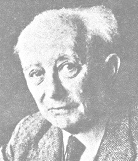 Max Born
Max Born Max Born
Max BornThe years 1921 to 1933 were Born's most productive. In collaboration with his students and assistants Werner Heisenberg, Pascual Jordan, and Wolfgang Pauli, he attempted to develop a new quantum mechanics. When Heisenberg succeeded in 1925, Born and others were able to advance the theory, using more systematic and powerful mathematics. For Born's interpretation of the square of Schrodinger's wave function as the probability of an electron's position, and for his further clarification of the wave-particle duality, he was awarded the Nobel Prize for physics in 1954.
Born, of Jewish origins, lost his professorship with Hitler's rise to power, but he soon was appointed (1936) to a chair at the University of Edinburgh, which he held until 1953. Upon retirement to the countryside near Gottingen, he not only continued his scientific work but wrote and spoke frequently on the social responsibility of scientists.
